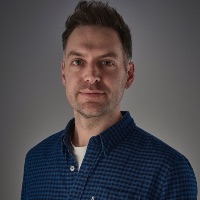Kaz Rodriguez talks viral hits, hybrid drums and A-list fans
Fast-rising Brit drum hero discusses past, present and future
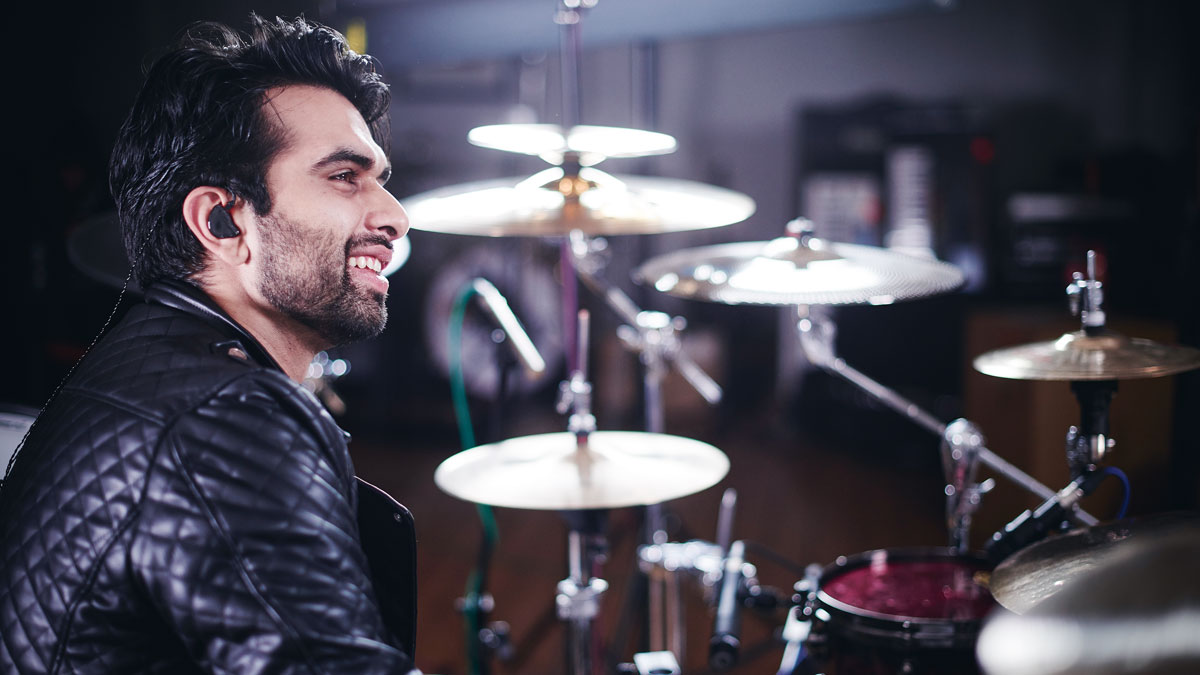
A new star
Kaz Rodriguez is a drummer very much treading his own path.
In his late teens Kaz was already emerging as a session player with potent drumming skills, an unbeatable work ethic and bags of promise. He worked with pop acts and spent a year earning his stripes on the road with Cirque Du Soleil. But it was when he opened his laptop and started making backing tracks for drummers that the magic really started happening.
Through sheer determination and a healthy dose of hustle, his trailblazing drum-shed tracks made their way into the hands and clinics of key players including Aaron Spears, Tony Royster Jr, Eric Moore and Chris Coleman. Kaz’s name spread like wildfire, his tracks started selling in their thousands and soon YouTube was buzzing with drummers jamming to odd-time fusion workouts like 7 To The Power Of 6. Three albums in and the hype surrounding Kaz is still growing. There’s even talk of a collaboration with super-fan Travis Barker.
Kaz always set out to create a signature drumming style and sound, just like his heroes Simon Phillips and Stewart Copeland. Not only is his fluid, groove-filled playing impossible to pigeonhole, but his pioneering spirit with unique custom drums, cymbal stacks and electronics has enabled him to add a visual and sonic stamp to everything he does. Kaz’s love of hybrid drumming and his desire to share his encyclopedic knowledge of electronics has even landed him a role as International Artist and hybrid guru for Roland, plus a packed schedule of international clinics and drum festivals.
While his musical journey didn’t start on such a positive note - family finances meant he couldn’t afford lessons and he suffered for years at the hands of bullies - the young drummer channelled his energy into honing his craft by whatever means possible, and at just 29 years of age he has achieved more than most drummers achieve in a lifetime. Here, Kaz opens up about his incredible journey, life lessons and why he’s only just getting started...
When did music first feature in your life?
“Rhythm was a natural thing to me, I was always tapping away. My dad used to play Michael Jackson’s Thriller on vinyl and my mum could feel me bumping away inside her tummy! It was meant to be. I also had this habit of not going in the bath or shower unless I was tapping on the tiles with music. The tiles on the wall were pitched. Early on my mum understood that I had this love for rhythm and it made me happy.”
Were there musicians in your family?
“I was brought up in a non-musical family. My family couldn’t afford to pay for music lessons and they wanted me to do something different, safer; be a doctor, an accountant. But I couldn’t do that.”
My family couldn’t afford to pay for music lessons and they wanted me to do something different, safer; be a doctor, an accountant. But I couldn’t do that.
So how did you go about learning the drums?
“Most drummers have stories about how they’ve struggled. This isn’t an easy game or craft, but I found ways to overcome it. I got bullied a lot and I used to wait in the school drum room for three hours so the bullies would go. My music teacher would let me stay there until she had to leave. I’d practise and try to figure out how this drum kit thing worked.”
When did you know you wanted to make a career from it? “
I always wanted to figure out how to make a career out of it. Every month I’d go into my local shop and buy drum magazines like Rhythm and check out my idols. I was listening to Michael Jackson, so Jonathan ‘Sugarfoot’ Moffatt was one. I was obsessed with Toto, Simon Phillips, Jeff Porcaro. And Stewart Copeland. Simon and Stewart were my two main guys. I tore out the front cover of Rhythm and put pictures on my wall. I said to myself, ‘I want to be like these guys one day.’
“I used to busk at age 11. My teacher allowed me to take a floor tom, a snare drum and a hi-hat. I put it all in one bag, and the floor tom was a kick drum. I used to go into Central London and busk illegally, just to make enough money. I wanted to figure out how a musician can get paid to play. I saved up until I could afford my first ever drum kit.”
So by this point you were starting to show promise behind the kit?
“I was a self-taught drummer, but my high school could see the potential in me and they got me a scholarship to a Saturday school called CYM (Centre For Young Musicians) in Waterloo.
"I met the most incredible drum teacher there who really pushed me. His name was Mark Bryant. He was a major influence on me, not through teaching me how to play drums, but mentally preparing me for how to understand drumming.
“I was all about chops as a kid. I dreamt about playing like Simon Phillips and I used to copy the way he plays. Mark could see that I was really obsessed with playing so many things, but he wanted me to cultivate and control it.”
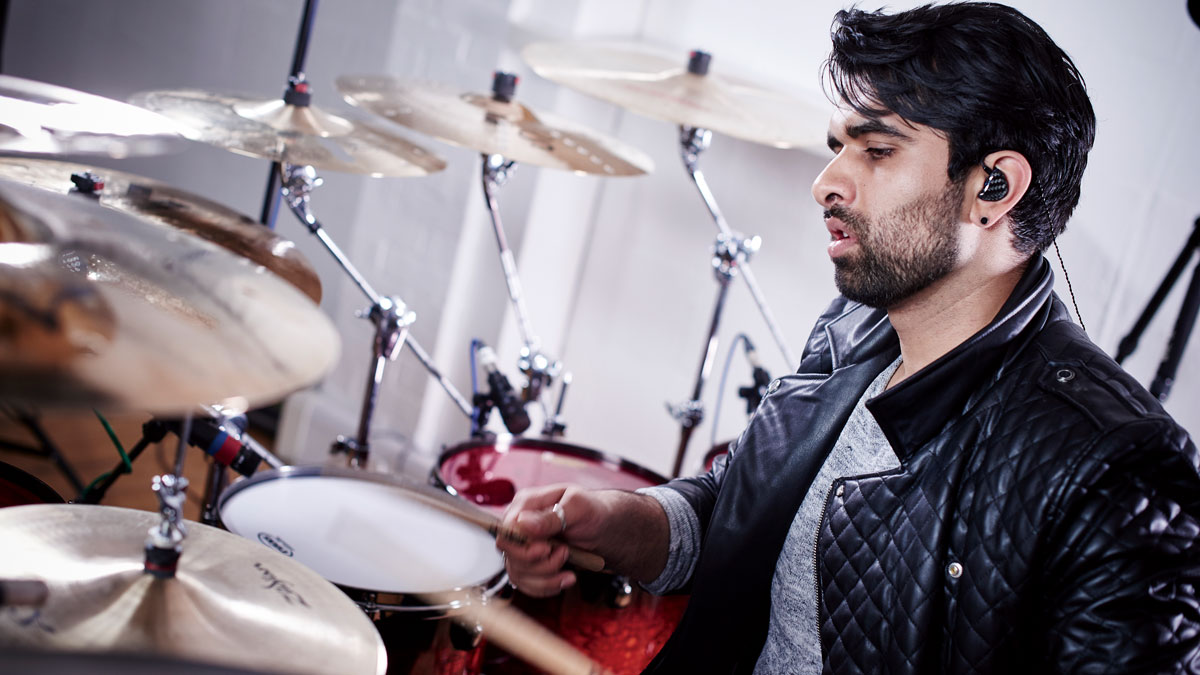
‘Dude, I want to play drums!'
How did your time at CYM help shape you?
“I went there to learn to play percussion and the first thing I got told to play was timpani. I was like, ‘Dude, I want to play drums! I want to play snare drum.’ We had to learn to read music, but I can’t read. I went in and started to blag it. I’d listen to the music and I’d remember a 10-minute piece of music by ear, pretend I was reading and turn the page at the same time as everyone else. I blagged my way through to be a second-line snare drummer.
“Mark walked past me every morning. He could see that I could play, and also that I wasn’t reading, but he was impressed that I could remember the piece. He came to me one day and said, ‘Come to my room.’ I thought I was going to get a drum lesson, but he just had a chat with me. One day he gave me a pair of Vic Firth Ralph Hardimon marching sticks. They’re like two logs in your hands.
“He put me on a kit and asked me to play some jazz. I played really loud. He kept stopping me and said, ‘Your lesson’s over.’ I never got the point of it. The next week he’d say, ‘Play some jazz for me.’ I used to get annoyed with myself. What is it he’s not understanding? One time I played it really quiet, effortlessly, and he said, ‘Alright, you’re ready.’ “He could see that from an emotional perspective I wanted to be all guns-blazing, because I was letting off steam from being bullied and I wanted to play drums to let out my frustration.
“He said to me, ‘There is something that you have that you need to be able to control.’ That was the best advice I could ever get. Because of him I am predominantly the person I am now. I was able to cultivate my ability to play groove and chops, and create balance. That was an amazing experience for me.”
I’d remember a 10-minute piece of music by ear, pretend I was reading and turn the page at the same time as everyone else. I blagged my way through to be a second-line snare drummer.
Did you have much experience playing with other musicians at this point?
“That started when I was at Richmond Upon Thames College. I started to meet lots of other musicians in my classroom. There were pubs just across the road and we used to play covers nights. I was actually in a muse tribute band. I was obsessed with muse. Dom [Howard] is one of my heroes. I love his playing. A lot of people think I’m into choppy players, but I’m actually very into groove players because I like what they bring.
“We used to play muse songs down the pub and just make 20-30 quid a night and whatever we got on the door. I was happy with that, I had to start somewhere. But as I progressed playing with these guys the band politics helped me understand how a band can also not get along. I like getting along with everyone, that’s my character. I didn’t understand why people were being divas. We split and I stopped playing drums. I quit, because I realised that maybe my dad was right. You need solidarity, a secure job.”
So how did drumming re-enter your life?
“I got a call to do a drum gig with Nitin Sawhney. I got to play with actual, passionate musicians, and it made me believe in myself again. I didn’t make it, I’d just quit playing and was still trying to get my bearings right, but it made me believe that I should be able to play again. From then on I would go to work, then go to a studio in North Acton and play for six hours a day, every day.”
I’ve always been a feeling kind of guy. Speed was never something that was important to me. It was more about my creativity.
What were you working on during that time?
“I really adapted my technique. At that time I couldn’t play time signatures and stuff like that, but I was really interested in it. I could understand how to go in and out of time, but I couldn’t explain it and I didn’t have a method. I’ve always been a feeling kind of guy. Speed was never something that was important to me. It was more about my creativity. I tried to be as musical as possible and tried to find something unique.”
The hard work was starting to pay off. You went to Westminster University after college...
“That’s where I got access to drums and studios and recording equipment. It allowed me to scope and shape my playing. A lecturer called Chris Banks put me in touch with a guy called Kojo, who’s one of the biggest MDs in the UK. He put me through for an audition with Jessie J. this is the pop world, but I came in chopsy. I didn’t get it because I was playing like I was trying to mask over the song. I was auditioning with a bass player who was playing with plan B and Stephanie McKay, a songwriter who worked with Portishead. The week after he asked me if I could play Glastonbury with Stephanie, just before Black Eyed peas on the Jazz world stage. From Glastonbury we played Solidays Festival in France which was beautiful, then onto Italy. Had I not gone to Uni I wouldn’t have been given the opportunity to tour. I’m a strong believer that if something’s not meant to be, something better will come or another opportunity will arise when you least expect it.”
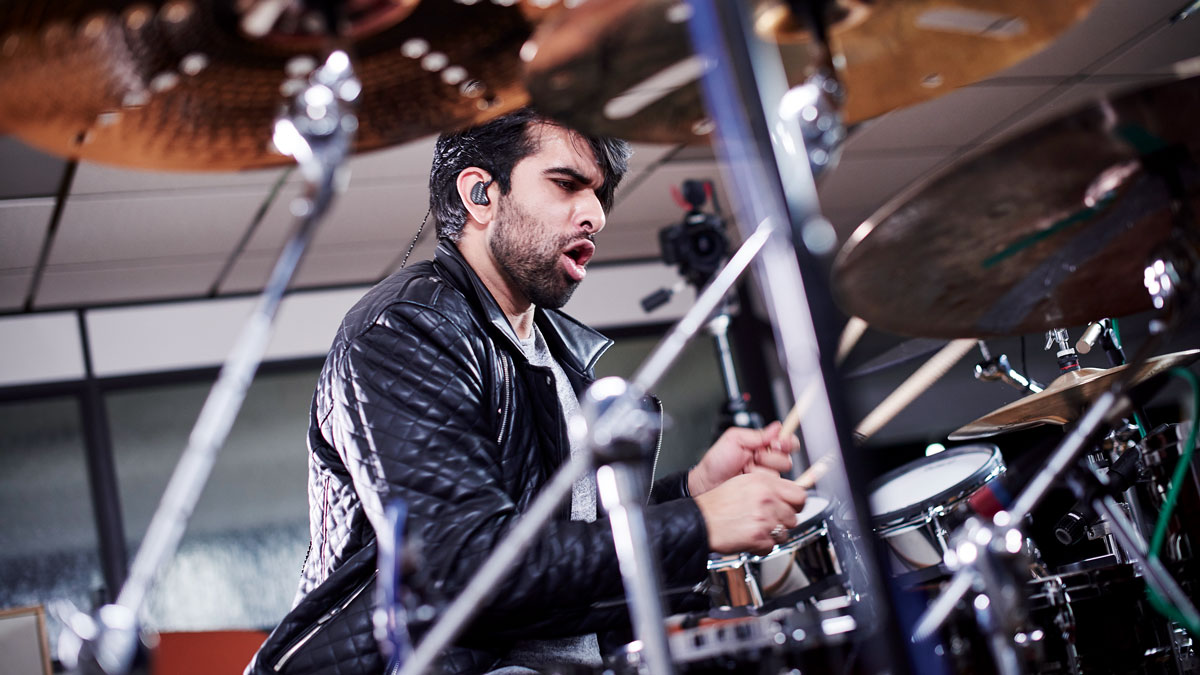
The big break
At what point did you manage to land the Cirque Du Soleil gig?
“I finished my first year at Uni and got a call from Bob Knight. he’s a fantastic drummer and an MD. Cirque du Soleil were casting for drummers. I was dead broke, I did auditions before and I’d never get the gig and I really didn’t want to do it, but it was the only hope I had. I was nervous. I knew I wasn’t going to get it, it’s a highly paid, very prestigious tour. [during the audition] they said, ‘can you play some drum’n’bass? can you play some technical stuff, some rock grooves?’ the day after I got a call saying, ‘are you ready to pack your bags and go away for a year?’
“I was still at university, but I took a gap year because you either stay broke or gain some finance, then build on yourself. I was fortunate to play with 15 top musicians from around the world and it really helped me push myself and learn how to groove, listen and play things that are expressive. I went from being Mr. First Year Choppy Chop Chops to feeling like I’d stepped into the professional world. I started to cultivate my sound more and I grew my level of playing. a lot of people block themselves and go, ‘I’m a gospel drummer, a rock drummer, a pop drummer.’ I play all styles and I love all styles, because I’m about everything. I love hearing culture. rhythm is not just rock. Break down a rock rhythm or play it fast and it could be drum’n’bass. slow down drum’n’bass it could be jazz. I think that’s why I’ve ended up making a sound for myself with my drumming.”
Talking of your sound, your drum set-up is pretty unique too.
“Your drum kit is a reflection of who you are. My kit is a hybrid set and I’d consider myself a hybrid drummer. I’ve had occasions where people would go to a gig and see the kit and know that I’m there. I want to create that identity from my set-up. There are people that see my sound as a very unique thing. I’m still trying to work on it. My Tama kit is a one-of-a-kind custom kit. I drew my perfect drum kit in my head and Tama made that happen. and Zildjian have been amazing helping me achieve the sounds that I want. I never thought I’d become an international artist for these brands.”
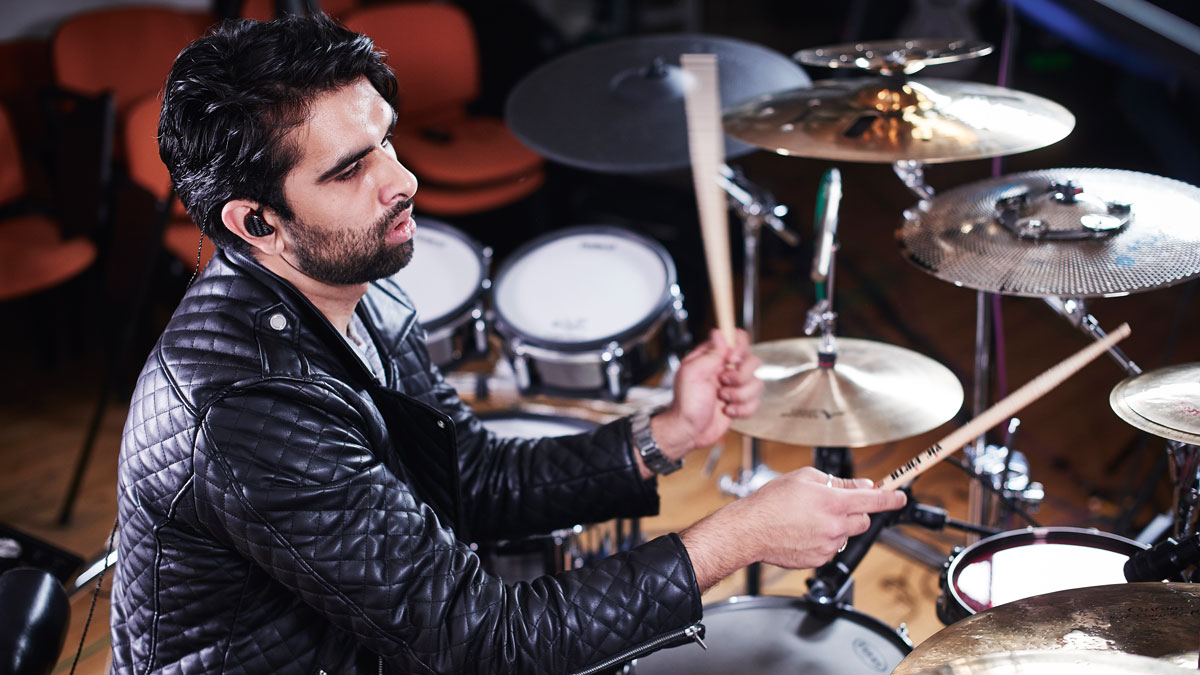
Songwriting superstar
Songwriting is a key element of your career now. When did you start dabbling with that?
“The Cirque du Soleil musicians suggested I try and write some music. people would see me practise before the show and say, ‘we can hear you play musically.’ I was so into the chop thing that I didn’t know I was playing musically. I was making tones with the toms, the snare drum was like my home and I’d do these linear things. I bought this Benny Greb DVD when I was in Germany. he said that if you can play a fill twice, it’s already musical - I was blown away. I started my second year at university and there was a midi keyboard and Logic. I had no idea how to use it, I just started playing drums on it. I started with this track called 7 To The Power of Six, which is probably the track people cover most on YouTube.”
Famously this track made its way into the hands of Aaron Spears.
“I found Aaron’s email and sent him the track. I told him he was a big inspiration to me. I didn’t expect anything in return. he responded three months after my first album came out and said, ‘Kaz, oh my god this track is dope.’ he shared my YouTube video on his fan page. That’s how everyone started to get to know me, because Aaron was pushing me. I made another track for him, ‘portal’, for the Vic Firth Fortress sessions. that went viral.”
Why do you think your music has clicked with so many great players?
“Because I’m a drummer they can understand what I do. since I was a kid I’ve watched these guys play, so I know how they play. When I wrote Go for Chris Coleman, I wrote it based on his technique. He’s actually played some parts that I wrote on MIDI drums live in his video. It’s surreal that he’s used some of my drum ideas. The best thing about being a drummer and a writer is when you can relate to it.”
I use drums like my survival tool, like a knife and fork. if you’re going to cut the steak you need the knife, you can’t just use the fork.
You’ve also become the face of hybrid drumming for Roland...
“There was a point in my life where I knew there was more to drumming than just acoustic drums and that music was growing into electronic music. I knew from my instinct that acoustic drummers were going to lose their jobs if they didn’t start doing something electronic as well.
“I was always trying to incorporate electronics within my drum kit, then I just made it work. I use drums like my survival tool, like a knife and fork. if you’re going to cut the steak you need the knife, you can’t just use the fork. You need the right tools to tackle what’s in front of you in the moment. If I turn left I’m in the electronics world, if I turn right I’m acoustic, but if I open my arms I’ve got both worlds.
“I spoke to Jules at Roland and said I would love to get involved. I wanted to grow this hybrid thing, and we started working together.”
Social media has played a key part in your growth and exposure as a drummer too.
“I predominantly use Instagram. You have access to the whole world, anyone can see you. For me it started with a 15-second clip. I was very insecure about playing my drums and posting videos, but I posted one video to see what would happen. Zildjian, Evans, Vic Firth and Tama all posted it and it went viral. I never would have thought 15 seconds could make a massive difference, but that changed my demographic.”
What are your biggest tips to other drummers wanting to share their playing on social media?
“Be authentic and don’t overdo it. I see a lot of guys doing overly professional videos just for an instagram clip. don’t. If it’s a clip from your phone people relate to it because they know that it’s real.
“Buy a GoPro. Yeah the sound is more compressed, but it has a decent sound for drums and the angle is good. If you have the audio equipment, record it. When I used to rehearse by myself I’d record kick, snare and overheads and mix it using YouTube tutorials. If you don’t have the time, just use GoPro or phone audio and post it. Technology is in our hands nowadays. Do something that’s real to you. Cover tracks if you want to cover tracks and try to do something nobody else is doing.”
I'm MusicRadar's eCommerce Editor. In addition to testing the latest music gear, with a particular focus on electronic drums, it's my job to manage the 300+ buyer's guides on MusicRadar and help musicians find the right gear for them at the best prices. I dabble with guitar, but my main instrument is the drums, which I have been playing for 24 years. I've been a part of the music gear industry for 20 years, including 7 years as Editor of the UK's best-selling drum magazine Rhythm, and 5 years as a freelance music writer, during which time I worked with the world's biggest instrument brands including Roland, Boss, Laney and Natal.
